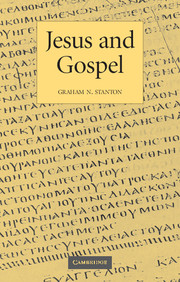Book contents
- Frontmatter
- Contents
- Preface
- List of abbreviations
- 1 Introduction
- PART I JESUS AND GOSPEL
- 2 Jesus and Gospel
- 3 The fourfold Gospel
- 4 Jesus traditions and gospels in Justin Martyr and Irenaeus
- 5 The law of Christ and the Gospel
- PART II JESUS
- PART III THE GOSPELS AND PAPYRI CODICES
- Bibliography
- Index of passages cited
- General index
2 - Jesus and Gospel
Published online by Cambridge University Press: 21 December 2009
- Frontmatter
- Contents
- Preface
- List of abbreviations
- 1 Introduction
- PART I JESUS AND GOSPEL
- 2 Jesus and Gospel
- 3 The fourfold Gospel
- 4 Jesus traditions and gospels in Justin Martyr and Irenaeus
- 5 The law of Christ and the Gospel
- PART II JESUS
- PART III THE GOSPELS AND PAPYRI CODICES
- Bibliography
- Index of passages cited
- General index
Summary
The subject of this chapter is the origin and early Christian use of the noun ‘gospel’, the verb ‘to proclaim good news’ (or, ‘to gospel’), and a set of near-synonyms. Given its importance in earliest Christianity and for Christian theology more generally, discussion of this topic has not been as extensive as one might have expected. On several key points opinion has been keenly divided and no consensus has emerged. I shall revisit some of the disputed issues and hope to advance discussion by offering several fresh considerations. In particular, I shall focus on the function of the word group in the religious and social setting of the earliest Christian communities.
‘GOSPEL’ IN CURRENT USAGE
In the sixteenth century the term ‘gospel’ featured frequently in the language repertoire of Erasmus and the Reformers. Erasmus often referred to ‘the gospel philosophy’. In his ‘Prologue to the New Testament’ (1525) the translator William Tyndale included an astute summary of ‘gospel’:
Euagelio (that we cal gospel) is a greke worde,
and signyfyth good, mery, glad and joyfull tydings,
that maketh a mannes hert glad,
and maketh him synge, daunce and leepe for ioye.
In that tumultuous century the term ‘the gospel’ often functioned as a shorthand way of referring to the Reformers and their distinctive views. For example, in 1547 John Hooper noted in a letter that, if the emperor (Charles V) should be defeated in war, King Henry VIII would adopt ‘the gospel of Christ’.
- Type
- Chapter
- Information
- Jesus and Gospel , pp. 9 - 62Publisher: Cambridge University PressPrint publication year: 2004
- 3
- Cited by



